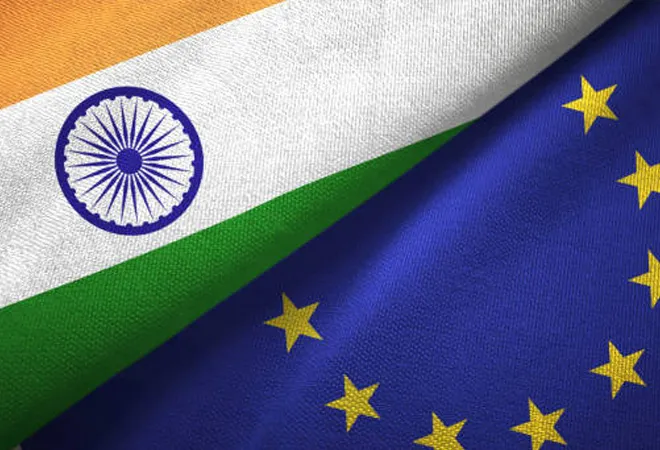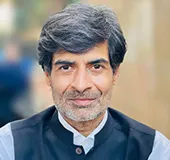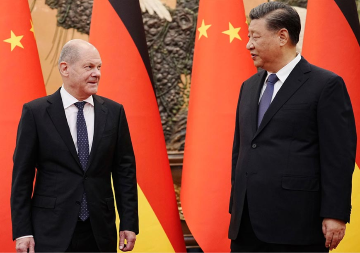
Our text of ancient fables, the
Panchatantra, speaks of “natural allies”. If there are ever natural allies in politics, the European Union (EU) and India should exemplify this relationship. Our cultural exchanges date back to ancient times; our languages have common roots; our borders are closer than ever via a human bridge that connects us: There are millions of Indians in the Middle East, and millions from the Middle East in Europe. Europe and India are a geographical continuum. And both the EU and India— “the world's largest democracies”—face shared threats and challenges. All roads must now connect Delhi and Brussels.
Here, we lay out a map to address three key challenges: The green transition, the digital transformation, and the preservation of our shared geopolitical landscape. On all three issues, direct and close cooperation between the EU and India will not only be vital for these two major powers and their people—but also for the world at large.
Green Transition
To address climate change, the EU and its members have been upping their domestic game. The
European Green Deal is only one amongst several key initiatives that illustrate the seriousness with which the EU is addressing the existential threat of climate change. At the same time, there is much angst in Europe that these efforts will not suffice unless they are matched by China and India. While the concerns are understandable, a narrative framed in terms of “what will become of the world if every Indian has a car” is patronising and misplaced, especially when one compares the per capita fossil consumption in India to the EU members. In any case, specifically with respect to India, the EU is pushing through an open door on the issue of addressing climate change. India has led the way in international initiatives on the issue of clean energy, for instance, by creating the International Solar Alliance with France. India’s commitment to protecting the environment, moreover, does not stem from recent pressure exercised by Greta Thunberg or
Fridays for Future. Contra western anthropocentrism in which activists advocate climate change mitigation for “our children’s future”, Indian philosophy teaches us that
the planet belongs to humans, plants, animals, and all living beings. There are, therefore, deep-rooted and inclusive reasons for Indians to be committed to protecting the planet. This commitment should not be doubted. Instead, the EU needs to find ways to invest in this Indian cause and co-create solutions for our common future.
The European Green Deal is only one amongst several key initiatives that illustrate the seriousness with which the EU is addressing the existential threat of climate change.
To achieve this, we need actions and not words. It has taken a full-blown war in the heart of Europe for Germany to recognise the risks of over-dependence on Russia for energy purposes; diversification is proving to be far slower and more complicated than many would like. In light of this experience, it is perhaps even more unreasonable than before to demand that India “phase out” coal at the click of a finger. The EU will have to put its money where its mouth is if it is serious about addressing the global problem of climate change. The Carbon Border Adjustment Mechanism, for example, should be more than a “poverty tax”, as it is seen in India; it should be a tool to finance and incentivise the green transition in globally integrated sectors in the emerging world. Technologies vital to low-carbon growth will need to be co-created and co-owned by Europe and partners like India. European capital must be given a nudge to flow into climate-conscious investment in the emerging world. It is up to the EU to make sure that India’s efforts pay off—through
significant European financing in key sectors, via public-private partnerships.
Digital Transformation
The EU is leading the way in setting people-centred standards on digital governance via GDPR. India’s Aadhaar Card scheme has shown the pioneering role that digitalisation can play in empowering the poor and facilitating development. There are also already several worrying examples of the pernicious effects of digital technology: Surveillance of local populations by authoritarian states, as well as the manipulation and control of infrastructure and security systems by external actors. To preserve the individual liberties of their people, and strengthen digital sovereignty, European and Indian cooperation will be key.
Research collaborations on dual-use technology, public-private partnerships for implementation and marketing of these innovations, and working jointly and through like-minded coalitions to establish rules for data governance and cyber-security are essential.
These two democratic powers will also be well-served to collaborate on diversifying away from their dependence on China, for e.g., on 5G technology and infrastructure development. Any trade agreement between the EU and India should prioritise this key consideration. Research collaborations on dual-use technology, public-private partnerships for implementation and marketing of these innovations, and working jointly and through like-minded coalitions to establish rules for data governance and cyber-security are essential. Neither the EU nor India can get left behind in a game that is dominated by the boardrooms in the US and party headquarters in China. India and the EU need to enter into a technology partnership that allows for all of this, and for ensuring reliable and integrated supply chains.
Shared geopolitical landscape
Our shared geopolitical landscape—extending beyond geographical proximities and including the Indo-Pacific—has been under extreme stress in recent years. The EU has a war triggered by Russia on its borders; India and its neighbours have had to put up with Chinese adventurism on the Himalayas and in their maritime neighbourhood.
Research collaborations on dual-use technology, public-private partnerships for implementation and marketing of these innovations, and working jointly and through like-minded coalitions to establish rules for data governance and cyber-security are essential.
This is a time for both the EU and India to be working together to help restore balance in the region. The EU will need to jump off the fence with respect to China; the European mantra of “partner, competitor, rival” is highly inadequate in dealing with a China that has signed a “no-limits” partnership with Russia. India will also need to rethink its own dependencies. The two democracies have now very real incentives to develop closer economic and military ties.
Sanctimonious lectures about morality will need to be replaced by a shared empathy of the like-minded. And all this will require the use of not only Europe’s favourite tool of “soft power”, but also the use of hard power through infrastructure projects, green investment, and military cooperation. Re-aligning their economic and security cooperation with each other will enable both the EU and India to stand up for the values that they both hold dear: Democracy and pluralism.
The views expressed above belong to the author(s). ORF research and analyses now available on Telegram! Click here to access our curated content — blogs, longforms and interviews.



 Our text of ancient fables, the Panchatantra, speaks of “natural allies”. If there are ever natural allies in politics, the European Union (EU) and India should exemplify this relationship. Our cultural exchanges date back to ancient times; our languages have common roots; our borders are closer than ever via a human bridge that connects us: There are millions of Indians in the Middle East, and millions from the Middle East in Europe. Europe and India are a geographical continuum. And both the EU and India— “the world's largest democracies”—face shared threats and challenges. All roads must now connect Delhi and Brussels.
Here, we lay out a map to address three key challenges: The green transition, the digital transformation, and the preservation of our shared geopolitical landscape. On all three issues, direct and close cooperation between the EU and India will not only be vital for these two major powers and their people—but also for the world at large.
Our text of ancient fables, the Panchatantra, speaks of “natural allies”. If there are ever natural allies in politics, the European Union (EU) and India should exemplify this relationship. Our cultural exchanges date back to ancient times; our languages have common roots; our borders are closer than ever via a human bridge that connects us: There are millions of Indians in the Middle East, and millions from the Middle East in Europe. Europe and India are a geographical continuum. And both the EU and India— “the world's largest democracies”—face shared threats and challenges. All roads must now connect Delhi and Brussels.
Here, we lay out a map to address three key challenges: The green transition, the digital transformation, and the preservation of our shared geopolitical landscape. On all three issues, direct and close cooperation between the EU and India will not only be vital for these two major powers and their people—but also for the world at large.
 PREV
PREV



